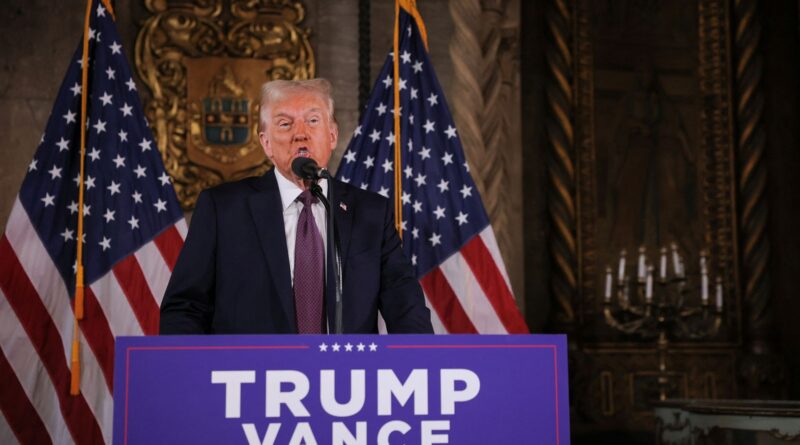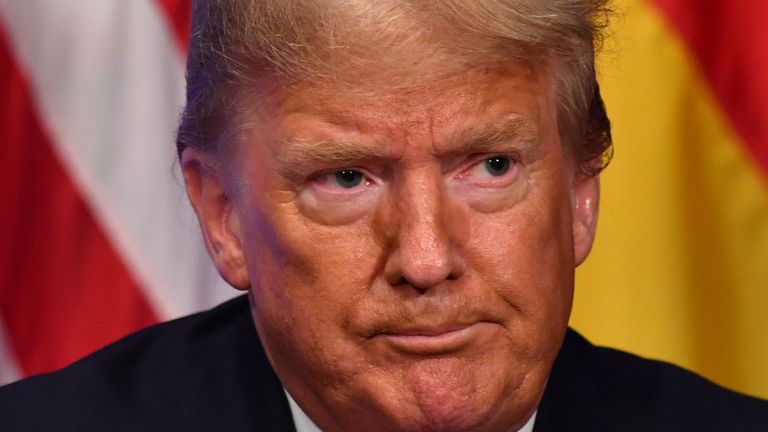Donald Trump’s Threats: A Critical Test for NATO’s Strength | World News
Donald Trump’s public declaration for NATO allies to allocate 5% of their national income to defense spending is likely to push governments across Europe, including the UK, into urgent consideration mode.
The UK positions itself globally, especially to the United States, as the largest defense spender in Europe and NATO’s most formidable military force.
However, Sir Keir Starmer has yet to outline a timeline for his ambition of increasing the defense budget to “2.5%” of GDP, up from just over 2% currently.
If the Prime Minister merely maintains this commitment, he might be perceived by the new administration as lacking ambition and credibility in matters of defense.
Furthermore, Mr. Trump has made an astonishing threat to forcibly acquire Greenland if needed, despite this crucial territory belonging to fellow NATO member Denmark.
If such an action were to occur, it would highlight the limitations of NATO’s Article 5, which is intended to guarantee mutual defense among allies under armed attack.
The question arises: what happens when the aggressor is also considered an ally?
The president-elect also seemed to quash any expectations of Ukraine gaining NATO membership in the near future—a key demand put forth by President Volodymyr Zelenskyy.
Instead, Mr. Trump expressed understanding for Vladimir Putin’s staunch opposition to that idea.
He mentioned that he would meet with the Russian president after taking office, reiterating a promise to end the war in Ukraine, though he again provided no specific strategy for doing so.
These remarks came during an extensive press conference on Tuesday, signaling a significant test for NATO—an alliance forged from the remnants of World War II.
Read more:
Trump discusses Canada, Gaza, and reversing Biden’s ban
Everything to know about Trump’s inauguration
NATO’s European members and Canada already faced intense scrutiny during Mr. Trump’s previous term in office—and justifiably so.
For years, the U.S. predominantly financed European security while many allies—including the UK—enjoyed the so-called “peace dividend” from the Soviet Union’s collapse, reallocating defense budgets to focus on areas like economic growth, healthcare, and education.
Mr. Trump expressed his dissatisfaction during his first term regarding what he perceived as the U.S. being taken advantage of, pledging to compel Europe to shoulder a larger share of the burden.
He even cautioned member countries that the U.S. would not assist an ally failing to meet a minimum NATO spending target of 2% of GDP—something they had committed to achieving by 2024 but had been slow to realize.
This rhetoric had a more electrifying impact on allies than even Putin’s 2014 invasion of Ukraine, including the annexation of Crimea and assaults in Eastern Ukraine.
However, in light of the escalating Russian threat following its full-scale invasion of Ukraine in 2022, as well as turmoil in the Middle East and challenges posed by China, it has become evident that allies’ increased defense expenditure was still insufficient to rebuild militaries across Europe that have been depleted over decades.
Read more from Sky News:
Trump’s Gaza warning risks becoming less threatening
Trump seeks dismissal of hush money conviction
Mark Rutte, NATO’s newly appointed Secretary-General, has set the stage for what is anticipated to be a renewed push for increased military investment during a pivotal speech last month, where he called for a shift to a “wartime mindset” and urged allies to “turbocharge” their defense budgets.
This call to action aims to counter escalating threats, but experts suggest it is also a pre-emptive reaction to the expected demands from the forthcoming Trump administration.
This situation presents a significant challenge for all allies, particularly for Sir Keir Starmer.
He and Rachel Reeves face a critical decision: pivot from their current priorities of economic growth, reducing hospital wait times, and expanding housing, to allocate additional resources to defense, or risk disregarding what will likely be increasing calls from the United States for substantial investments in the UK’s military—potentially jeopardizing the UK’s security in the process.




